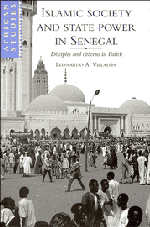Book contents
- Frontmatter
- Contents
- List of tables
- Acknowledgments
- A note on spelling
- Glossary
- Map of Senegal
- Introduction: good Africans, good citizens, good Muslims
- 1 Islam in the politics of state–society relations
- 2 The structure of society: Fatick in the Senegalese context
- 3 The state–citizen relationship: struggle over bridges
- 4 The marabout–disciple relationship I: foundations of recruiting and following
- 5 The marabout–disciple relationship II: the structures of allegiance
- 6 The state–marabout relationship: collaboration, conflict, and alternatives
- 7 Bureaucrats, marabouts, and citizen–disciples: how precarious a balance?
- Notes
- Select bibliography
- Index
- Titles in the series
Introduction: good Africans, good citizens, good Muslims
Published online by Cambridge University Press: 10 November 2009
- Frontmatter
- Contents
- List of tables
- Acknowledgments
- A note on spelling
- Glossary
- Map of Senegal
- Introduction: good Africans, good citizens, good Muslims
- 1 Islam in the politics of state–society relations
- 2 The structure of society: Fatick in the Senegalese context
- 3 The state–citizen relationship: struggle over bridges
- 4 The marabout–disciple relationship I: foundations of recruiting and following
- 5 The marabout–disciple relationship II: the structures of allegiance
- 6 The state–marabout relationship: collaboration, conflict, and alternatives
- 7 Bureaucrats, marabouts, and citizen–disciples: how precarious a balance?
- Notes
- Select bibliography
- Index
- Titles in the series
Summary
Two dimensions of Senegalese exceptionalism: religion and politics
Shortly after arriving in the town of Fatick I made a series of courtesy visits to introduce myself to local marabouts, religious leaders of the Islamic Sufi orders. Without exception I was warmly received, and all of these men indicated their willingness to discuss their religion with me, evidently pleased by my interest. Embarking on this task immediately, one offered to lend me a cassette recording of a speech by one of Senegal's most important marabouts of the Tijaniyya Sufi order; he would bring it to me personally as soon as he recovered it from the local Catholic priest to whom he had previously lent it. This cross-religious connection in itself was rather surprising. Then listening to the speech a few days later, I was startled to hear the marabout proclaim: “Senegalese Muslims are not only Muslims. They are also the citizens of a republic, the activists of a party. They are also negroes. And that which Islam requires of them is that they be at the same time very good negroes, very good citizens, and excellent activists.”
Certainly not all marabouts would say the same, as I was to learn. Indeed, the same marabout at different times has struck a notably different tone. Yet the fact that the statement would be made by an important and wellknown religious figure nevertheless underscores one of the most salient features of Senegalese Islam.
- Type
- Chapter
- Information
- Islamic Society and State Power in SenegalDisciples and Citizens in Fatick, pp. 1 - 14Publisher: Cambridge University PressPrint publication year: 1995

